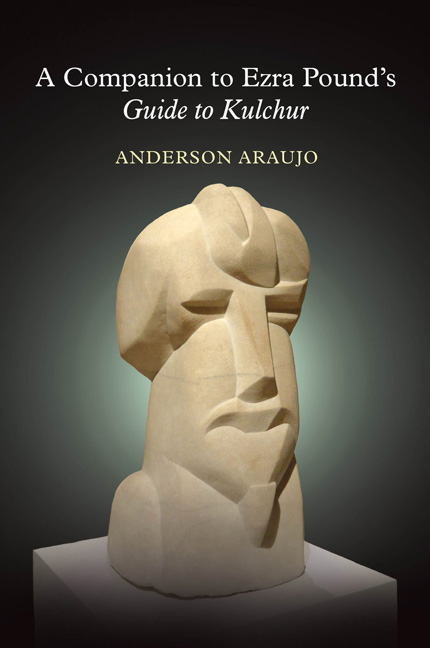Book contents
- Frontmatter
- Contents
- Acknowledgments
- Abbreviations
- Introduction
- Guide to Kulchur
- Part I
- Section I
- Section II
- Part II
- Section III
- 10 Guide
- 11 Italy
- 12 Aeschylus and . . .
- 13 Monumental
- Section IV
- Part III
- Section V
- Section VI
- Part IV
- Section VII
- Section VIII
- Section IV
- Part V
- Section X
- Section XI
- Part VI
- Section XII
- Section XIII
- Addenda: 1952
- Notes
- Index
12 - Aeschylus and . . .
from Section III
- Frontmatter
- Contents
- Acknowledgments
- Abbreviations
- Introduction
- Guide to Kulchur
- Part I
- Section I
- Section II
- Part II
- Section III
- 10 Guide
- 11 Italy
- 12 Aeschylus and . . .
- 13 Monumental
- Section IV
- Part III
- Section V
- Section VI
- Part IV
- Section VII
- Section VIII
- Section IV
- Part V
- Section X
- Section XI
- Part VI
- Section XII
- Section XIII
- Addenda: 1952
- Notes
- Index
Summary
Sophokles: (c.495–406 BCE) Athenian tragedian, author of more than 120 plays, including Oedipus Rex, Antigone, and Women of Trachis. Pound's complaint about the mediocre quality of translations of works by Sophocles and other Greek dramatists in the next paragraph echoes his August 1916 letter to Iris Barry, where he complains about “a bad trans. of Sophocles” and opines that “the whole Oedipus story is a darn silly lot of buncombe—used as a peg for some very magnificent phrases. Superbly used.”
Eliot's interment of Murray … greek language”: Pound paraphrases from Eliot's essay, “Euripides and Professor Murray,” which takes to task Australian-British classical scholar Gilbert Murray (1866–1957) for his verse translation of Medea, a tragedy by Euripides (c.480–407 BCE). For Eliot, Murray has “sapped our soul and shattered the cup of all life for Euripides” by his electing “the William Morris couplet [and] the Swinburne lyric” in place of the genuine sound of ancient Greek verse.
I asked Eliot to have a shot at the Agamemnon … it stands rock-like: Pound greatly admired Aeschylus's tragedy, the chief play in the Oresteia trilogy, as demonstrated in these passages and elsewhere (cf. note GK 24). That Agamemnon and Prometheus Bound prompt Pound to associate the plays with Shakespeare's Pericles, Prince of Tyre may simply owe to the fact that he had been corresponding with the classicist W. H. D. Rouse (cf. note GK 71). In a letter dated November 4, 1937, Pound quotes Lysimachus's lines in Act 4, Scene 6: “Faith, she would serve, (pause) / after a long voyage at sea,” and praises a cadence “so well-taken that even the archaism in the first word doesn't dim the naturalness of the sentence.” Yet it was precisely his and Eliot's inability to produce a similar naturalness of speech in their never-completed translation of the Agamemnon that frustrated Pound.
- Type
- Chapter
- Information
- A Companion to Ezra Pound's Guide to KulcherGuide to Kulcher, pp. 128 - 132Publisher: Liverpool University PressPrint publication year: 2018

